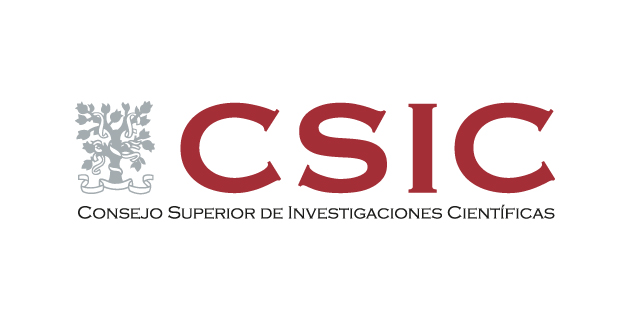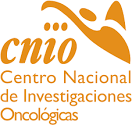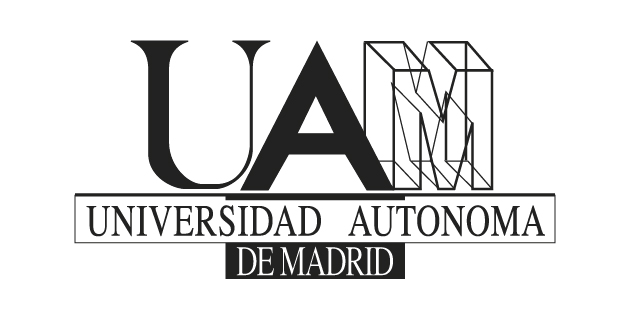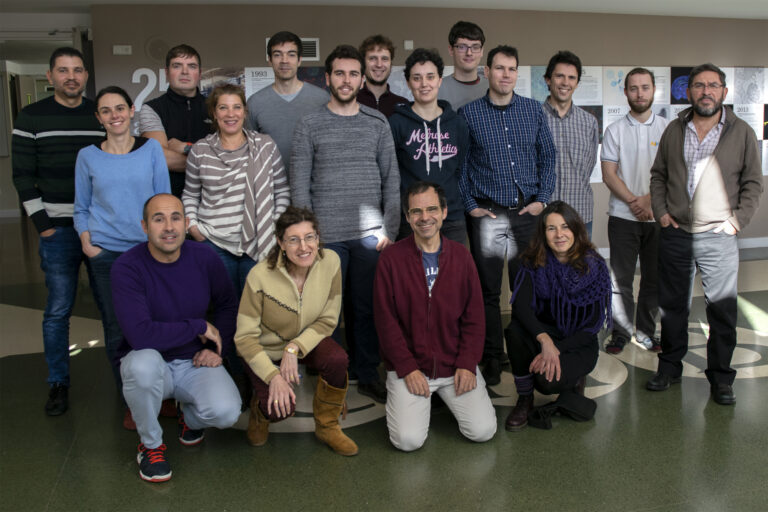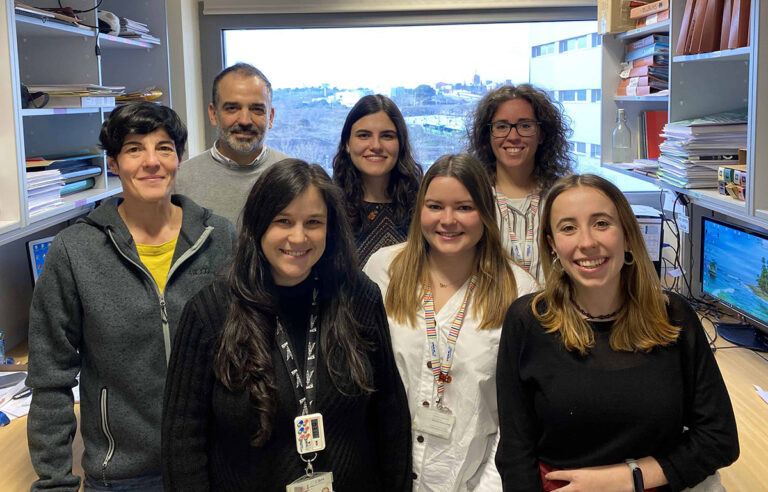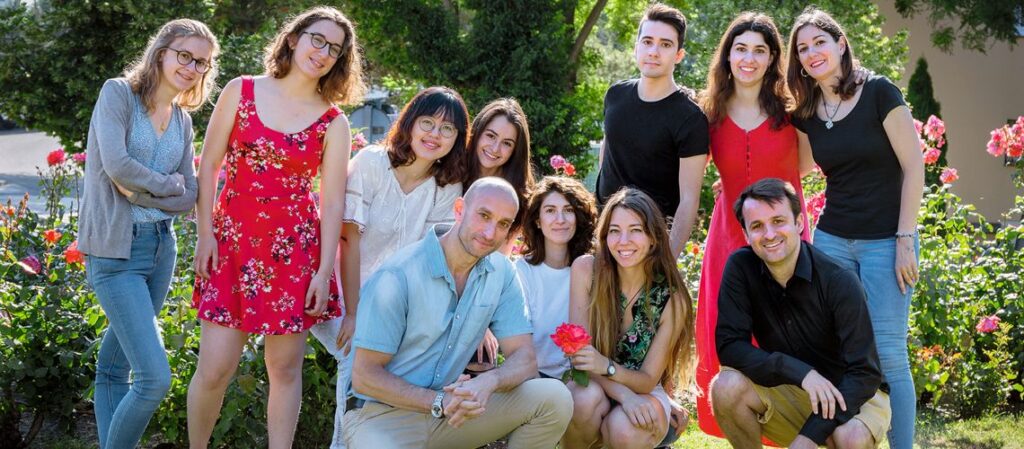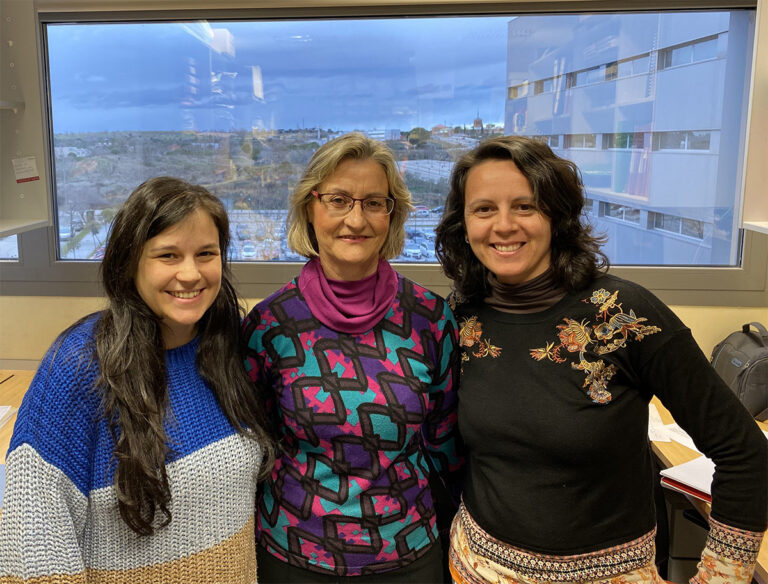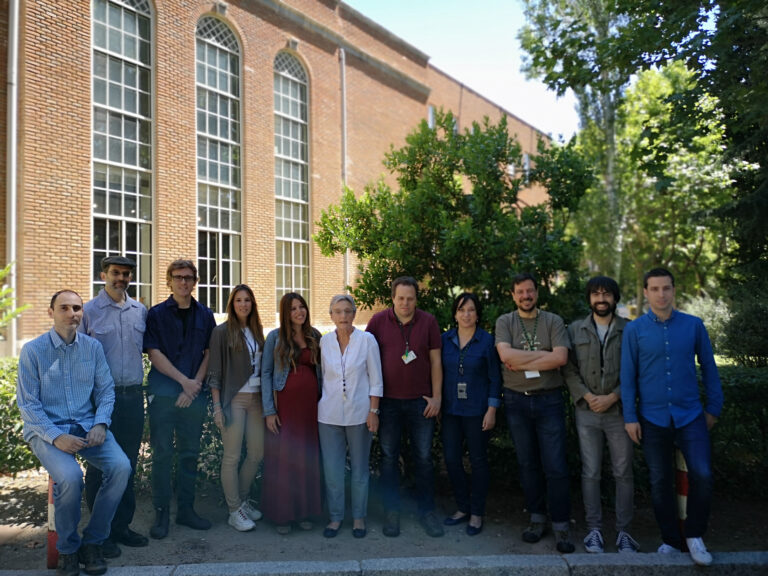TomoXliver - CM
Estudio de la disfunción del hepatocito desde un abordaje multidisciplinar.
Referencia: S2017/BMD-3817
Objetivos
El hígado es un órgano cuyo parénquima está formado en un 80% por hepatocitos que deben adquirir una polaridad apicobasal para llevar a cabo funciones vitales. Éstas incluyen, entre otras, la detoxificación de la sangre, el metabolismo de lípidos y la secreción de proteínas, hormonas y ácidos biliares hacia una red de canales, denominados canalículos biliares (BC), que drenan estas moléculas hacia el tracto grastrointestinal. Entre las numerosas patologías hepáticas, una de las de mayor impacto por su extrema gravedad en la infancia es la colestasis intrahepática familiar progresiva (PFIC), enfermedad de origen genético que causa pérdida de polaridad del hepatocito y la disfunción del BC. Por su parte, las dietas hipercalóricas conducen a la enfermedad asociada al hígado graso no alcohólico (NAFLD), que está alcanzando una escala epidémica en las sociedades ricas y sedentarias. Con una frecuencia significativa, la PFIC y el hígado graso inducen una respuesta inflamatoria hepática que progresa hacia el carcinoma hepatocelular. Esto, junto con datos previos obtenidos por los grupos participantes en este proyecto, sugiere la existencia de mecanismos moleculares comunes en la evolución patogénica de estos dos síndromes de etiología diferente.
En este contexto, nuestro proyecto reúne grupos de investigación básica y clínica, expertos en PFIC, metabolismo, nutrientes y cáncer, polaridad celular, inflamación, proteómica y estructura de macromoléculas, con el objetivo de llevar a cabo un estudio integral del hepatocito mediante una combinación de análisis estructurales, bioquímicos, celulares y clínicos.
Nuestro objetivo es ayudar a definir de forma sistemática la patogénesis molecular e interacción de la PFIC y de la NAFLD, así como promover el descubrimiento de herramientas de base molecular para diseñar nuevas terapias.
Our Vision
The liver is a vital organ. 80% of its parenchyma is made up of hepatocytes that must acquire apicobasal polarity in order to carry out their various functions, which include blood detoxification, lipid metabolism, and the secretion of proteins, hormones and bile acids into a network of channels known as the bile canaliculi (BC), which drain these molecules into the gastrointestinal tract.
Of the many hepatic pathologies, progressive familial intrahepatic cholestasis (PFIC) is a genetic disease that causes loss of hepatocyte polarity and BC dysfunction and is extremely severe in children. Hypercaloric diets lead to the establishment and chronification of nonalcoholic fatty liver disease (NAFLD), which is reaching epidemic levels in affluent and sedentary societies. PFIC and fatty liver frequently induce an inflammatory hepatic response that progresses towards hepatocellular carcinoma, suggesting the existence of common molecular mechanisms in the pathogenic evolution of these two syndromes, despite their different etiologies.
In this context of high social impact, the present project brings together basic and clinical research groups, experts in PFIC, metabolism, nutrients and cancer, cell polarity, inflammation, proteomics and macromolecular structure, with the objective of carrying out an integral investigation of the hepatocyte by a combination of structural, biochemical, cellular and clinical studies.
Our goal is to define systematically the molecular pathogenesis and interaction of PFIC and NAFLD, and to promote the discovery of new molecularbased tools to design new therapies.
Associated Groups and Companies
Associated Groups
CIC bioGUNE
Prof. Jose Maria Mato
Website: https://www.cicbiogune.es/people/jmmato
ALBA (Sincrotrón ALBA (CELLS)
Dra. Eva Pereiro
Website: https://www.albasynchrotron.es/en/beamlines/bl09-mistral/staff
Cells (The Gurdon Institute University
of Cambridge, UK)
Dra: Meritxell Huch
Website: http://www.gurdon.cam.ac.uk/research/huch
HEPACARE (CIMA – Universidad de Navarra)
Dr. Matías Ávila
Website: https://cima.unav.edu/investigacion/programas-verticales/hepatologia/dano-hepatico-y-carcinogenesis-desarrollo-de-estrategias-terapeuticas
ProtMol (Universidad de Zaragoza)
Dr. Javier Sancho
Website: https://janovas.unizar.es/sideral/CV/javier-sancho-sanz
Companies
Lilly S.A
IP: María José Lallena
Website: https://www.lilly.es
Proteobotics S. L.
IP: Antonio Ramos Fernández
Website:
Broadcasting
During these pandemic times, our groups have been involved in new research projects related to COVID19:
HepMol:
– Bloqueo de CCR2 para reducir inflamación pulmonar y agravamiento del COVID19
Proteo – CNB:
– PIE CSIC 202020E108: Investigación de la interacción del SARS-CoV-2 y el huésped a nivel proteómico
BCU througth Instruct – ERIC:
– 2019-nCoV: Extracting the maximum of information from the Spike cryoEM data.
– Covid19: Structural resource with map annotations.(3DBionotes-COVID19
===========================================
2022:
PhDThesis: Unconventional therapies for cancer treatment.
Tatiana Grazioso
PhDThesis: La proteína MALL: Identificación en los cuerpos PML y su implicación en la organización nuclear.
Universidad Autónoma de Madrid.
Armando Rubio Ramos
PhDThesis: Estudio de la regulación de la barrera endotelial por las Rho GTPasas de la subfamilia RhoA.
Universidad Autonoma de Madrid
Natalia Colás Algora
2021
PhDThesis: Análisis proteómico cualitativo y cuantitativo por espectrometría de masas en tándem para la identificación de biomarcadores de naturaleza proteica asociados a preeclampsia.
Universidad Autonoma de Madrid
Rosa Ana Navajas
MasterThesis: Caracterización funcional del proteome de organoides de origen hepático y estudio de las alteraciones que se producen en un modelo de colestasis.
Irene Blázquez
2020:
PhDThesis: Human vitreous proteome in vitreoretinal diseases.
Fátima Raquel Santos
PhDThesis: Il-17A in obesity, metabolic syndrome and HCC
Universidad Autonoma de Madrid
Ana Teijeiro
PhDThesis: Role and functions of MCRS1 in liver disease.
Universidad Autonoma de Madrid.
Amanda Garrido
PhDthesis: Aprendizaje automático en biología estructural: un estudio de interacciones proteicas.
Universidad Autonoma de Madrid.
Rubén Sanchez García
PhDthesis: Mecanismos moleculares que median la polarizacion apical y función de ICAM-1 en células epiteliales hepaticas.
Universidad Autonoma de Madrid
Cristina Cacho Navas
MasterThesis: Caracterización funcional de APIP mediante proteómica diferencial.
Universidad Autonoma de Madrid
Vítor Masipe.
MasterThesis: Caracterización del fosfoproteoma durante la regeneración hepática.
Universidad Complutense de Madrid.
Irene Blázquez
MasterThesis: Liver organoids as a new therapeutic tool for hepatic disease modelling: insights into progressive familial intrahepatic cholestasis type.
Beatriz Queipo López
2019:
PhDthesis: Intrinsically disordered proteins: Structure, dynamics and molecular recognition using NMR spectroscopy.
Universidad de Alcalá, Alcalá de Henares
Belén Chaves Arquero
PhDThesis: Role of URI in intestinal homeostasis and radiation enteropathy
Universidad Autónoma de Madrid.
Almudena Chaves Pérez
PhDThesis: Local quality assesment of cryo-EM reconstructions and its applications
Universidad Autonoma de Madrid
Jose Luis Vilas Prieto
2018:
MasterThesis: Cuantificación absoluta mediante proteómica dirigida de enzimas del 1CM (one carbon metabolism) en patologías hepáticas
Laura Guerrero
PhDthesis: Design and structural characterization of minimized systems to study biomolecular interactions Universidad Complutense de Madrid
Angelica Ines Partida-Hanon
PhDthesis: Regulación de la longitud del cilio primario por la proteína Caveolina 1
Universidad Autonoma de Madrid
Laura Rangel Sanchez
2022
Seminar: 30/03/2022
Matias Avila, PhD
Programa de Hepatología-CIMA – UNIVERSIDAD DE NAVARRA
Title: Novel mechanisms and diagnostic strategies in hepatobiliary tumors”
Seminar: 31/05/2022
Meritxell Huch, PhD
Max Planck Institute of Molecular – Cell Biology and Genetics
Title: Liver organoids for the study of regeneration and cancer.
Seminar: 08/06/2022
Javier Sancho, PhD
Instituto de Biocomputación y Física de Sistemas Complejos (BiFi), Universidad de Zaragoza.
Title: Protein Stability in Genetic Interpretation and Biotechnology. Calculation versus Classification.
2021
Seminar: 09/12/2021
Eva Pereiro, PhD
MISTRAL beamline – Experiment Division- ALBA SYNCHROTRON LUGHT SOURCE.
Title: Locating specific structures or molecules in cells by cryo 3D X-ray imaging”Locating specific structures or molecules in cells by cryo 3D X-ray imaging”
2020
Seminar: September 18, 2020 (Postponed due the COVID19 outbreak . The final dates will be announced)
CNB – CSIC
Eva Pereiro, PhD
MISTRAL beamline
Experiments Division – ALBA SYNCHROTRON LIGHT SOURCE
Seminar: April 27, 2020 (Postponed until the second half of the year due the COVID19 outbreak . The final dates will be announced)
CNB – CSIC.
Matias Avila Seminar,PhD
Programa de Hepatología-CIMA – UNIVERSIDAD DE NAVARRA
Congress: 17th Iberian Peptide Meeting
(IQFR-CSIC), Madrid, Spain,
February 5-7, 2020
2019
Training course: “XIII Manuel Rico NMR summer school” (GERMN-RSEQ)
Jaca, Huesca, Spain,
June 16-21, 2019
Workshop: “Inauguration of the NMR R-LRB ICTS”
Instituto Química-Física Rocasolano (IQFR-CSIC),
Madrid, Spain, June 7, 2019
2022
Rubio-Ramos, M. Bernabé-Rubio, L. Labat-de-Hoz, J. Casares-Arias, L. Kremer, I. Correas, M.A. Alonso.
MALL a membrane-tetra-spanning proteolipid overexpressed in cancer, is present in membraneless nuclear biomolecular condensates.
Cell Mol Life Sci. 79(5):236.
https://doi.org/10.1007/s00018-022-04270-w
Cacho-Navas, N. Reglero-Real, N. Colás-Algora, S . Barroso, G. de Rivas, K. Stamatakis, J. Feito, G. Andrés, M. Fresno, L. Kremer, I. Correas, M.A. Alonso J. Millan
Plasmolipin regulates basolateral-to-apical transcytosis of ICAM-1 and leukocyte adhesion in polarized hepatic epithelial cells.
Cell Mol Life Sci. 79(1):61.
https://doi.org/10.1007/s00018-021-04095-z
R.Sanchez-Garcia, J.R.Macias, C.O.S.Sorzano, J.M.Carazo, J.Segura.
BIPSPI+: Mining Type-Specific Datasets of Protein Complexes to Improve Protein Binding Site Prediction.
JMB. 434(11): 167556
https://doi.org/10.1016/j.jmb.2022.167556
J.Jiménez de la Morena, P.Conesa, Y.C.Fonseca, F.P.de Isidro-Gómez, D.Herreros, E.Fernández-Giménez, D.Strelak, E.Moebel, T.O.Buchholz, F.Jug, A.Martinez-Sanchez, M.Harastani, S.Jonic, J.J.Conesa, A.Cuervo, P.Losana, I.Sánchez, M.Iceta, L.del Cano, M.Gragera, R.Melero, G.Sharov, D.Castaño-Díez, A.Koster, J.G.Piccirillo, J.L.Vilas, J.Otón, R.Marabini, C.O.S.Sorzano, J.M.Carazo.
ScipionTomo: Towards cryo-electron tomography software integration, reproducibility, and validation.
JSB. 214(3): 107872
https://doi.org/10.1016/j.jsb.2022.107872
C. O. S. Sorzano, A. Jiménez-Moreno, D. Maluenda, M. Martínez, E. Ramírez-Aportela, J. Krieger, R. Melero, A. Cuervo, J. Conesa, J. Filipovic, P. Conesa, L. del Caño, Y. C. Fonseca, J. Jiménez-de la Morena, P. Losana, R. Sánchez-García, D. Strelak, E. Fernández-Giménez, F. P. de Isidro-Gómez, D. Herreros, J. L. Vilas, R. Marabini and J. M. Carazo.
On bias, variance, overfitting, gold standard and consensus in single-particle analysis by cryo-electron microscopy.
Acta Cryst. D78, 410-423
https://doi.org/10.1107/S2059798322001978
Guerrero L, Paradela A, Corrales FJ.
Development of a Standardized MRM Method for the Quantification of One Carbon Metabolism Enzymes.
Methods Mol Biol. 2420:159-175.
https://doi.org/10.1007/978-1-0716-1936-0_13
Guerrero L, Sangro B, Ambao V, Granero JI, Ramos-Fernández A, Paradela A, Corrales FJ.
Monitoring one-carbon metabolism by mass spectrometry to assess liver function and disease.
J Physiol Biochem. 78(1):229-243.
https://doi.org/10.1007/s13105-021-00856-3
2021:
Garrido A, Kim E, Teijeiro A, Sánchez Sánchez P, Gallo R, Nair A, Matamala M, Perna C, Vicent GP, Muñoz J, Campos-Olivas R, Melms JC, Izar B, Schwabe RF and Djouder N
Histone acetylation of bile acid transporter genes plays a critical role in liver cirrhosis.
Journal of Hepatology. S0168-8278(21)02294-7.
https://doi.org/10.1016/j.jhep.2021.12.019
Sánchez PS, Rigual MDM, Djouder N.
Inflammatory and Non-Inflammatory Mechanisms Controlling Cirrhosis Development.
Cancers. 13(20):5045.
https://doi.org/10.1016/j.trecan.2020.08.005
Jose Ramon Macias, Ruben Sanchez-Garcia, Pablo Conesa, Erney Ramirez-Aportela, Marta Martinez Gonzalez, Carlos Wert-Carvajal, Alberto M Parra-Perez, Joan Segura Mora, Sam Horrell, Andrea Thorn, Carlos O S Sorzano, Jose Maria Carazo.
3DBionotes COVID-19 edition
Bioinformatics. 37(22): 4258–4260
https://doi.org/10.1093/bioinformatics/btab397
David Herreros, Roy R. Lederman,James Krieger,Amaya Jiménez-Moreno, Marta Martínez, David Myška, David Strelak,Jiri Filipovic, Ivet Bahar, Jose Maria Carazo, Carlos Oscar S. Sanchez.
Approximating deformation fields for the analysis of continuous heterogeneity of biological macromolecules by 3D Zernike polynomials.
IUCrJ. 8(6): 992-1005
https://doi.org/10.1107/S2052252521008903
David Strelak,Amaya Jiménez-Moreno,José L. Vilas,Erney Ramírez-Aportela,Ruben Sánchez-García,David Maluenda,Javier Vargas, David Herreros,Estrella Fernández-Giménez,Federico P. de Isidro-Gómez,Jan Horacek, David Myska,Martin Horacek,Pablo Conesa,Yunior C. Fonseca-Reyna,Jorge Jiménez, Marta Martínez, Mohamad Harastani, Slavica Jonić, Jiri Filipovic,Roberto Marabini,José M. Carazo, Carlos O. S. Sorzano.
Advances in Xmipp for Cryo–Electron Microscopy: From Xmipp to Scipion.
Molecules.26 (20)
https://doi.org/10.3390/molecules26206224
E.Fernández-Giménez, M.Martínez, R.Sánchez-García, R.Marabini, E.Ramírez-Aportela, P.Conesa, J.M.Carazo, C.O.S.Sorzano.
Cryo-EM density maps adjustment for subtraction, consensus and sharpening
JSB. 213(4): 107780
https://doi.org/10.1016/j.jsb.2021.107780
M.Kazemi, C.O.S.Sorzano, J.M.Carazo, A. desGeorges, V.Abrishami, J.Vargas
ENRICH: A fast method to improve the quality of flexible macromolecular reconstructions.
Progress in Biophysics and Molecular Biology. 164: 92-100
https://doi.org/10.1016/j.pbiomolbio.2021.01.001
Ruben Sanchez-Garcia, Josue Gomez-Blanco, Ana Cuervo, Jose Maria Carazo, Carlos Oscar S. Sorzano, Javier Vargas.
DeepEMhancer: a deep learning solution for cryo-EM volume post-processing.
Commun Biol 4, 874
https://doi.org/10.1038/s42003-021-02399-1
C. O. S. Sorzano, J. M. Carazo
Principal component analysis is limited to low-resolution analysis in cryoEM
Acta Cryst. D77: 835-839
https://doi.org/10.1107/S2059798321002291
Jiménez-Moreno, L. del Caño, M. Martínez, E. Ramírez-Aportela, A. Cuervo, R. Melero, R. Sánchez-García, D. Strelak, E. Fernández-Giménez, F.P. de Isidro-Gómez, D. Herreros, P. Conesa, Y. Fonseca, D. Maluenda, J. Jiménez de la Morena, J.R. Macías, P. Losana, R. Marabini, J.M. Carazo, C.O.S. Sorzano.
Cryo-EM and Single-Particle Analysis with Scipion
JJOVEOVE-JOURNAL OF VISUALIZED EXPERIMENTS. 171: 62261
https://doi.org/10.3791/62261
A.Jiménez-Moreno, D.Střelák, J.Filipovic, J.M.Carazo, C.O.S.Sorzano
DeepAlign, a 3D alignment method based on regionalized deep learning for Cryo-EM
JSB. 213(2): 107712
https://doi.org/10.1016/j.jsb.2021.107712
Sergio Ciordia, Gloria Alvarez-Sola, María Rullán, Jesús M Urman, Matías A Ávila, Fernando J Corrales
Digging deeper into bile proteome.
J Proteomics. 230:103984
https://doi.org/10.1016/j.jprot.2020.103984
Sorzano, C O S; Semchonok, D; Lin, S-C; Lo, Y-C; Vilas, J L; Jimenez-Moreno, A; Gragera, M; Vacca, S; Maluenda, D; Martinez, M; Ramirez-Aportela, E; Melero, R; Cuervo, A; Conesa, J J; Conesa, P; Losana, P; Cano, L Del; de la Morena, J Jimenez; Fonseca, Y C; Sanchez-Garcia, R; Strelak, D; Fernandez-Gimenez, E; de Isidro, F; Herreros, D; Kastritis, P L; Marabini, R; Bruce, B D; Carazo, J M.
Algorithmic robustness to preferred orientations in single particle analysis by CryoEM.
Journal of structural biology.213 (1): 107695
https://doi.org/10.1016/j.jsb.2020.107695
Erney Ramírez-Aportela, David Maluenda, Yunior C. Fonseca, Pablo Conesa, Roberto Marabini, J. Bernard Heymann, Jose Maria Carazo & Carlos Oscar S. Sorzano
FSC-Q: a CryoEM map-to-atomic model quality validation based on the local Fourier shell correlation
Nature Communications. 12:42
https://doi.org/10.1038/s41467-020-20295-w
2020:
Colás-Algora N, Millán J.
How many cadherins do human endothelial cells express?
Cell Mol Life Sci. 2019 Apr;76(7):1299-1317
https://doi.org/10.1007/s00018-018-2991-9
Urman JM, Herranz JM, Uriarte I, Rullán M, Oyón D, González B, Fernandez-Urién I, Carrascosa J, Bolado F, Zabalza L, Arechederra M, Alvarez-Sola G, Colyn L, Latasa MU, Puchades-Carrasco L, Pineda-Lucena A, Iraburu MJ, Iruarrizaga-Lejarreta M, Alonso C, Sangro B, Purroy A, Gil I, Carmona L, Cubero FJ, Martínez-Chantar ML, Banales JM, Romero MR, Macias RIR, Monte MJ, Marín JJG, Vila JJ, Corrales FJ, Berasain C, Fernández-Barrena MG, Avila MA.
Pilot Multi-Omic Analysis of Human Bile from Benign and Malignant Biliary Strictures: A Machine-Learning Approach.
Cancers (Basel). 12(6):E1644
https://doi.org/10.3390/cancers12061644
Colás-Algora, N., García-Weber, D., Cacho-Navas, C., Barroso, S., Caballero, A., Ribas C., Correas, I and Millán, J.
Compensatory increase of VE-cadherin expression through ETS1 regulates endothelial barrier function in response to TNF.
Cellular Molecular Life Sciences. 77(11):2125-2140
https://doi.org/10.1007/s00018-019-03260-9
Sanchez-Garcia, R; Segura, J; Maluenda, D; Sorzano, COS; Carazo, JM
MicrographCleaner: A python package for cryo-EM micrograph cleaning using deep learning
Journal of Structural Biology. 210(3): UNSP 107498
https://doi.org/10.1016/j.jsb.2020.107498
Martinez, M; Jimenez-Moreno, A; Maluenda, D; Ramirez-Aportela, E; Melero, R; Cuervo, A; Conesa, P; del Cano, L; Fonseca, YC; Sanchez-Garcia, R; Strelak, D; Conesa, JJ; Fernandez-Gimenez, E; de Isidro, F; Sorzano, COS; Carazo, JM; Marabini, R
Integration of Cryo-EM Model Building Software in Scipion
Journal of Chemical Information and Modeling.60(5): 2533-2540
https://doi.org/10.1021/acs.jcim.9b01032
Carter, SD; Hampton, CM; Langlois, R; Melero, R; Farino, ZJ; Calderon, MJ; Li, W; Wallace, CT; Tran, NH; Grassucci, RA; Siegmund, SE; Pemberton, J; Morgenstern, TJ; Eisenman, L; Aguilar, JI; Greenberg, NL; Levy, ES; Yi, E; Mitchell, WG; Rice, WJ; Wigge, C; Pilli, J; George, EW; Aslanoglou, D; Courel, M; Freyberg, RJ; Javitch, JA; Wills, ZP; Area-Gomez, E; Shiva, S; Bartolini, F; Volchuk, A; Murray, SA; Aridor, M; Fish, KN; Walter, P; Balla, T ; Fass, D; Wolf, SG; Watkins, SC; Carazo, JM; Jensen, GJ; Frank, J; Freyberg, Z
Ribosome-associated vesicles: A dynamic subcompartment of the endoplasmic reticulum in secretory cells
Science Advances. 6(14): eaay9572
https://doi.org/10.1126/sciadv.aay9572
Vilas, JL; Vargas, J; Martinez, M; Ramirez-Aportela, E; Melero, R; Jimenez-Moreno, A; Garduno, E; Conesa, P; Marabini, R; Maluenda, D; Carazo, JM; Sorzano, COS
Re-examining the spectra of macromolecules. Current practice of spectral quasi B-factor flattening
Journal of Structural Biology.209(3): UNSP 107447
https://doi.org/10.1016/j.jsb.2020.107447
Zamora-Carreras, B. Maestro, J.M. Sanz, y M.A. Jiménez.
Turncoat polypeptides: We adapt to our environment.
ChemBioChem 21, 432-441
https://doi.org/10.1002/cbic.201900446
2019:
Ramirez-Apotela, E., Mota, J., Conesa, P., Carazo, JM and Sorzano, COSS.
DeepRes: a new deep-learning and aspect-based local resolution method for electron-microscopy maps.
IUCrJ. Volume 6(6)
https://doi.org/10.1107/S2052252519011692
Ramirez-Aportela E., Vilas JL, Glukhova, A, Melero, R, Conesa, P, Martínez, M, Manuel, D. Mota, J., Jimenez A, Vargas, J, Marabini R, Sexton PM, Carazo JM, Sorzano COSS.
Automatic local resolution-based sharpening of cryoEM maps.
Bioinformatics. btz671
https://doi.org/10.1093/bioinformatics/btz671
Maluenda, D; Majtner, T; Horvath, P; Vilas, J L; Jimenez-Moreno, A; Mota, J; Ramirez-Aportela, E; Sanchez-Garcia, R; Conesa, P; Del Cano, L; Rancel, Y; Fonseca, Y; Martinez, M; Sharov, G; Garcia, C A; Strelak, D; Melero, R; Marabini, R; Carazo, J M; Sorzano, C O S
Flexible workflows for on-the-fly electron-microscopy single-particle image processing using Scipion.
Acta crystallographica.Volumen:75(10):882-894
https://doi.org/10.1107/S2059798319011860
Jimenez, A; Jonic, S ; Majtner, T; Oton, J; Vilas, JL; Maluenda, D; Mota, J; Ramirez-Aportela, E ; Martinez, M; Rancel, Y; Segura, J; Sanchez-Garcia, R; Melero, R; del Cano, L; Conesa, P; Skjaerven, L; Marabini, R; Carazo, JM; Sorzano, COS.
Validation of electron microscopy initial models via small angle X-ray scattering curves.
Bioinformatics. 35(14): 2427-2433
https://doi.org/10.1016/j.yjsbx.2019.100016
Segura J, Sanchez-Garcia R, Sorzano COS, Carazo JM.
3DBIONOTES v3.0: Crossing molecular and structural biology data with genomic variations.
Bioinformatics. pii: btz118
https://doi.org/10.1093/bioinformatics/btz118
Laura Rangel, Miguel BernabŽ-Rubio, Jaime Fern‡ndez-Barrera, Javier Casares-Arias, Jaime Mill‡n, Miguel A. Alonso & Isabel Correas
Caveolin-1_ regulates primary cilium length by controlling RhoA GTPase activity
Scientific Reports 9, Article number: 1116
https://www.nature.com/articles/s41598-018-38020-5#Ack1
Colás-Algora N, Millán J.
How many cadherins do human endothelial cells express?
Cellular and Molecular Life Science. 76(7):1299-1317
https://link.springer.com/article/10.1007%2Fs00018-018-2991-9
2018:
Vilas JL, Tabassum N, Mota J, Maluenda D, Jiménez-Moreno A, Majtner T, Carazo JM, Acton ST, Sorzano COS.
Advances in image processing for single-particle analysis by electron cryomicroscopy and challenges ahead.
Curr Opin Struct. 52:127-145
http://hdl.handle.net/10261/179961
Angulo-Urarte A, Casado P, Castillo SD, Kobialka P, Kotini MP, Figueiredo AM, Castel P, Rajeeve V, Milà-Guasch M, Millan J, Wiesner C, Serra H, Muixi L, Casanovas O, Viñals F, Affolter M, Gerhardt H, Huveneers S, Belting HG, Cutillas PR, Graupera M.
Endothelial cell rearrangements during vascular patterning require PI3-kinase-mediated inhibition of actomyosin contractilit
Nature Communications. 9(1). 4826 (1-16)
https://www.nature.com/articles/s41467-018-07172-3
Marabini R, Kazemi M, Sorzano COS, Carazo JM.
Map challenge: Analysis using a pair comparison method based on Fourier shell correlation.
J Struct Biol. 204(3):527-542
http://hdl.handle.net/10261/179446
García-Weber D, Millán J.
Parallels between single cell migration and barrier formation: The case of RhoB and Rac1 trafficking.
Small GTPases. 9(4): 332-338
https://www.ncbi.nlm.nih.gov/pmc/articles/PMC5997161/
Gómez-Blanco J, de la Rosa-Trevín JM, Marabini R, Del Cano L, Jiménez A, Martínez M, Melero R, Majtner T, Maluenda D, Mota J, Rancel Y, Ramírez-Aportela E,Vilas JL, Carroni M, Fleischmann S, Lindahl E, Ashton AW, Basham M, Clare DK, Savage K, Siebert CA, Sharov GG, Sorzano COS, Conesa P, Carazo JM
Using Scipion for stream image processing at Cryo-EM facilities.
J Struct Biol. 204(3):457-463
http://hdl.handle.net/10261/172712
Heymann JB, Marabini R, Kazemi M, Sorzano COS, Holmdahl M, Mendez JH, Stagg SM, Jonic S, Palovcak E, Armache JP, Zhao J, Cheng Y, Pintilie G, Chiu W, Patwardhan A, Carazo JM.
The first single particle analysis Map Challenge: A summary of the assessments.
J Struct Biol.204(2):291-300
https://doi.org/10.1016/j.jsb.2018.08.010
Jiménez A, Jonic S, Majtner T, Otón J, Vilas JL, Maluenda D, Mota J, Ramírez-Aportela E, Martínez M, Rancel Y, Segura J, Sánchez-García R, Melero R, Del Cano L, Conesa P, Skjaerven L, Marabini R, Carazo JM, Sorzano COS
Validation of Electron Microscopy Initial Models via Small Angle X-Ray Scattering Curves.
Bioinformatics. bty985
https://doi.org/10.1093/bioinformatics/bty985
2022:
Grupo HepMol – Madri+d Job Bank Reference: 42621
Grupo HepMol – Madri+d Job Bank Reference: 43112
2021:
CNIO Group – Madri+d Job Bank Reference: 40948
ProteoCNB Group – Madri+d Job Bank Reference: 40745
UAM Group – Madri+d Job Bank Reference: 39044
2020:
RMN Group – Madri+d Job Bank Reference: 37803
CNIO Group – Madri+d Job Bank Reference: 36443
2019:
BCI Group – Madri+d Job Bank Reference: 34805
CNIO Group – Madri+d Job Bank Reference: 33995
HepMolGroup – Madri+d Job Bank Reference: 32958
RMN Group – Madri+d Job Bank Reference: 31665
UAM Group – Madri+d Job Bank Reference: 32601
2018
BCI Group – Madri+d Job Bank Reference: 27810
CNIO Group – Madri+d Job Bank Reference: 29877
BCU Group – Madri+d Job Bank Reference: 28181
BCU Group – Madri+d Job Bank Reference: 29891
ProteoCNB Group – Madri+d Job Bank Reference: 29072
BCI Group – Madri+d Job Bank Reference: 30017
Contact Information
Scientific contact:
Jose Maria Carazo Garcia
Telephone: (+34) 91 585 4543
E-mail: carazo@cnb.csic.es
Admin contact:
Blanca E. Benitez
Telephone: (+34) 91 585 4922
E-mail: blanca@cnb.csic.es
Postal address:
Unidad de Biocomputación – Centro Nacional de Biotecnología
c/ Darwin, 3 (Universidad Autónoma de Madrid)
28049 Cantoblanco, Madrid (Spain)

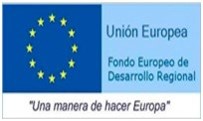


Find us at Centro Nacional de Biotecnología (CNB). Darwin 3.
Campus de Cantoblanco. 28049 Madrid (Spain)
Phone: (+34) 91 585 4510
E-mail: bioinfo@cnb.csic.es
Fax: (+34) 91 372 0112
Copyright © 2017 Biocomputing Unit. All Rights Reserved.
